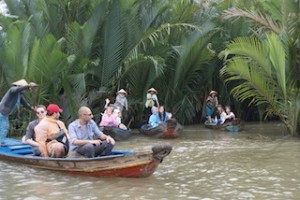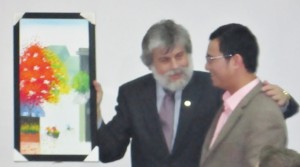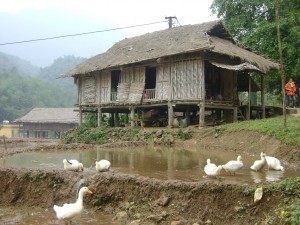The John Marshall Law School has put another country in its collection of places where students have traveled and studied the law at the same time.
Associate Dean Ralph Ruebner and Professor Shahram Dana accompanied 12 students from Dana’s International Human Rights class on a 14-day study mission to Vietnam. It was the first time the Vietnamese government had officially invited a U.S. law school delegation to its country to engage in human rights discourse.
John Marshall students previously have traveled, with professors, to South Africa, China, Israel, Switzerland, Italy, Ireland, Scotland, Peru and the Czech Republic.
In Vietnam, the group met with the Vietnamese Lawyers Association, the Vietnam Bar Foundation, attorneys at the Galaxy Law Firm and professors and students from the Ho Chi Minh City University of Law. It was at the university that students had a frank discussion on the lasting effects of Agent Orange, a toxic chemical defoliant used by the U.S. government during the Vietnam War. Agent Orange is known to have had harmful health effects on the Vietnamese, as well as U.S. soldiers.
Additionally, in Hanoi, students met with the U.S. Ambassador to Vietnam and senior staff members of the U.S. Embassy as well as directors of U.S. Aid for International Development (USAID).
Study sessions included meetings on Vietnamese constitutional law, criminal law, administrative law, environmental law, property law, and Vietnam’s obligations to various international human rights covenants.
But not all the learning took place inside. Students also were offered an introduction to Vietnamese culture, history and the foundations of its legal system with visits to important cultural sites, as well as to private homes of the country’s ethnic minorities. The group also visited the Cu Chi tunnels, used by Viet Cong guerrillas during the war, and rode boats down the Mekong River, visiting fruit gardens and floating markets and eating fresh fish.
Student Meghan Tribe found much to her liking including the scenic beauty, delicious food and friendly people. But what most affected her was the chance to visit historical sites.
“My generation never experienced the Vietnam War, nor the sights and sounds that come along with it,” she said. “Being in these places and seeing these relatively unchanged landmarks made the experience achingly real and, at times, uncomfortable.
“But what made it so worthwhile was that feeling of discomfort and coming to terms with the idea that the pursuit of human rights advocacy is more than a philosophical excursion but rather a grasping of the tangible and real.”
Tribe said students visited the War Remnants Museum and saw an exhibit on the disabilities caused by Agent Orange, but also noticed people on the streets of Hanoi and Ho Chi Minh City who had been disfigured by the chemical. Tribe said the discussion about Agent Orange with the Vietnamese law professors was open and refreshing and “illustrated the purpose of our trip.”
Dana, the International Human Rights professor, said students were engaged and inquisitive, learned about the social issues facing Vietnam and were challenged to think beyond the borders of the U.S.
“I thought it was a fantastic learning experience for students and opened up to them a whole new set of opportunities on how a law degree can be put to service for social justice,” he said.



